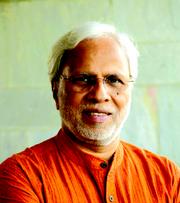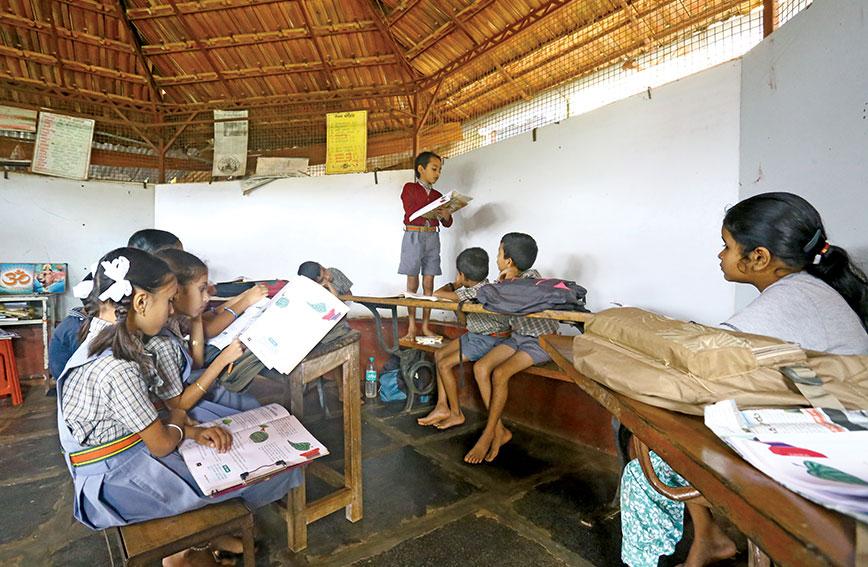
DILEEP RANJEKAR
One of the first Bal Melas the Azim Premji Foundation organised was in March 2008 around the theme of “Metrics and Measurements.” Five hundred children from 14 schools, 150 teachers from 26 schools, 50 government education functionaries, and 900 parents and community members not only enthusiastically participated but actively contributed to the event. The key objectives of the Bal Mela included (a) To help the parents and community members understand the value of education and school (b) Develop among the children the ability to appreciate the importance of communicating and interacting with the community and (c) Demonstrate how the mathematical concepts learnt in the classroom have relevance in real life.
There were 32 stalls created entirely by the children, most of which dealt with subjects related to mathematics while three were around the language used in metrics and measurements. The visitors (parents, community members and children from other schools) got an opportunity to participate in exercises and games that were explained to them by the children in various stalls. Some illustrations — measuring height, guessing the weight of the objects, throwing objects and guessing the distances, and so on.
More important, the children got invaluable experience in planning the event, developing ideas for the stalls, managing the entry and exit of more than 1,000 people, allocating the appropriate students for the stalls, explaining the games to visitors and judging the results of the games in a fair manner. They also learnt how to productively interact with their teachers, seek ideas when needed and decide which suggestions they would take seriously. It was a wonderful opportunity for children from Classes 3 to 8 from different schools to work as teams, adapt to different views, resolve conflicts and adhere to self-committed discipline. Since then the Azim Premji Foundation has been organising Bal Melas around several themes across the 50 districts in which it is present.
In my childhood, children like me were expected to help our parents in their household work. We used to closely observe how our mother was curdling milk and tying it up in a piece of cloth to hang it overnight. The next morning it would become a solid pulp, ready to be thoroughly mixed with sugar, cardamom and saffron to make a delicious dessert called shreekhand. A few questions naturally came to our minds on the content of this substance — was it fat, was it protein or was it carbohydrate, and we were adequately educated that the process eliminated everything else to leave just protein behind.
The simple experience of buying vegetables necessitated the development of several skills in us. We had to negotiate better rates (art of negotiation and knowing prevailing rates), check the integrity in weighing (knowledge of weights and balances and keen observation skills), get the correct change back (calculations — maths), strike a pleasant chord with the vendor (interpersonal skills), ensure we bought the right quality (ability to sort vegetables based on characteristics of fresh vegetables) and arrange them suitably in the bag in which we were carrying them. Potatoes, onions and cabbage at the bottom of the bag and tomatoes and bananas on the top. Most of these were learnt through actually doing them or through keen observation. And all this at the age of 10 to 12 years.
Today’s children — especially in urban, well-to-do families — are singularly deprived of such experiences, not being required to or not encouraged to participate in household chores. This leads to some schools evolving special days requiring the children to dress as “earth” or “tree” or to earn some money by helping someone with work and so on. And it gets limited to only such days without pervading the day-to-day life of children in a seamless manner.
One of the common criticisms of the existing education system is that it tends to be bookish and detached from real life. Most of the education seems to be focused on mere cognitive skills revolving around rote learning of the content of subjects. Life skills such as critical thinking, ability to interpret, reflecting on thoughts and actions, communication, interpersonal skills and, above all, “learning and relearning” to adapt to ever-changing new situations in life are hardly dealt with consciously through the education process.
If education has to prepare children to be able to cope with their future as well as that of the society they live in, education must have a reasonably clear idea of the skills and abilities that children need to be helped to develop. The future is uncertain and can hardly be predicted accurately. The nature of school would dramatically change. In fact, there could be multiple kinds of schools. Technology would witness several discontinuous and radical changes. The knowledge and cognitive abilities developed today run the risk of being obsolete in one or several major turns of events.
There are several life skills that we need to inculcate in our children to prepare them to meet their future. I mention three important ones: (a) Ability to adapt to change and cause change (b) Ability to relearn (includes openness to embracing change) and (c) Resilience to endure changed and difficult circumstances.
We find no systematic planning or strategy in schools to inculcate these abilities in our children. It is ridiculous to waste time remembering things that can be stored digitally. Mere abilities of “knowing” and “retrieving” are not important. How we learn to make sense of the huge amount of information that we are deluged with, is far more important. The really important and complicated ideas can be learnt only by dealing with them. They need to be taught in many ways — not just through lectures or blackboard diagrams; but through mind mapping or metaphors, meaningfully designed text books with appropriate exercises and so on. Teachers will have to be developed to present their ideas in many more ways, depending on the particular children they work with.
Children will have to be developed not only to solve existing problems but also to discover new ones. The human species is very diverse and children have exposure to people with different beliefs. We cannot hide from people who are different, nor can we go about destroying such people. Developing the abilities to try to understand and collaborate with such people is critical for life. Being a responsible citizen of the classroom, school, family and the world outside is another facet of being successful in life. This needs a more abstract frame of thinking. While ethics can be easily classified as one of the values, being an ethical professional is also a life skill — since it will build respect for you. It also has an important element of “my career vs the contribution I make to the larger society”. A large part of this aspect cannot be taught but has to be learnt through what you see, experience and observe. Having role models around you helps enormously.
Helping children develop life skills will be based on the following important strategies:
- Have good, researched analysis to identify the life skills that are eternally useful, anticipating the dramatic changes in future
- Life skills reflected in curriculum, pedagogy and assessment
- Building a caring, collaborative and inclusive classroom and school culture to foster such skills
- Teacher education and teacher professional development for life skill development in schools
- Involving the community and other stakeholders
If we want to realise our constitutional commitment of being a just, equitable and humane society, it will not happen merely by teaching maths, language, science and so on. It is imperative to integrate necessary life skills in the education process right from the school stage.
Dileep Ranjekar is CEO of the Azim Premji Foundation
Comments
Currently there are no Comments. Be first to write a comment!




